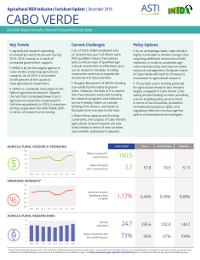Authors:
Léa Vicky Magne Domgho, Antonio Fortes and Gert-Jan Stads
Year:
2018
Publisher
International Food Policy Research Institute and National Agricultural Research and Development Institute.
Back to:
Key Trends
Agricultural research spending increased by nearly 50 percent during 2014–2016, mainly as a result of increased government support. INIDA is by far the largest agency in Cabo Verde conducting agricultural research. As of 2016, it accounted for 89 percent of the country’s total agricultural researchers. UNICV is a relatively new player in the field of agricultural research. Despite the fact that it employed fewer than 3 agricultural researchers (expressed in full-time equivalents) in 2016, it maintains strong cooperation ties with INIDA, both in terms of research and training.
Current Challenges
As of 2016, INIDA employed only 22 researchers, just 3 of whom were PhD-qualified. Hence, the institute lacks a critical mass of qualified agri- cultural researchers to effectively carry out its research mandate. Funding constraints continue to impede the recruitment of new scientists. Roughly 80 percent of INIDA’s funding is provided by the national govern- ment. However, the bulk of it is used to foot the institute’s salary bill. Funding for research programs and infrastruc- ture are heavily reliant on outside funding from donors, and tends to fluctuate from one year to the next. Given these capacity and funding constraints, the outputs of Cabo Verde’s agricultural research system are rela- tively limited in terms of new varieties and scientific publications released.
Policy Options
As an archipelago state, Cabo Verde is highly vulnerable to climate change, thus requiring additional resources to build resilience. In order to accelerate agri- cultural productivity and improve water resource management, the government of Cabo Verde will need to increase its investment in agricultural research. The private sector funding potential for agricultural research also remains largely untapped in Cabo Verde. Culti- vating private funding involves providing a more enabling policy environment in terms of tax incentives, protection of intellectual property rights, and regulatory reforms to encourage the spill-in of international technologies.

